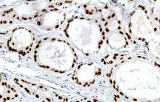
Anti-Androgen receptor CE/IVD for IHC - Genitourinary pathology
Androgen receptor (AR) is a member of the steroid receptor superfamily that is essential for the growth of prostate cancer cells. It has been reported that tyrosine phosphorylation of AR is induced by growth factors and elevated in hormone-refractory prostate tumors. Data suggest that growth factors and their downstream tyrosine kinases, which are elevated during hormone-ablation therapy, can induce tyrosine phosphorylation of AR. Such modification may be important for prostate tumor growth under androgen-depleted conditions. Cellular signaling occurs following androgen binding to the AR and translocation to the nucleus. This activated complex associates with androgen-responsive elements contained in the DNA sequence of target genes, affecting the transcriptional activity of these genes. AR antibody labels epithelial cells and stromal cells in normal prostate. AR reactivity is also found in other types of cells, including epithelial cells of the breast and hepatocytes. In prostate cancer, AR expression is maintained throughout cancer progression. Immunohistochemistry of AR is useful for the evaluation of prostate cancer in routinely processed tissues. The majority of androgen independent hormone refractory prostate cancers express AR. Transcriptional activation of AR is involved in refractory antiandrogen therapy. Androgen receptor expression has been helpful in predicting the clinical response to anti-androgenic treatment.


Prostate
Prostate tumor
Search result : 3 product found
Refine your search :
RUOCE / IVD
- Unconjugated 3
- human 3
- Primary antibody
- IHC 3
- IHC511 3
Cat#
Description
Cond.
Price Bef. VAT
‹
›


